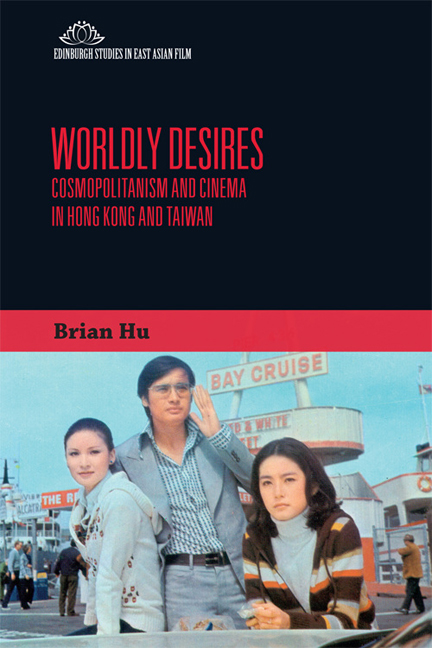Book contents
- Frontmatter
- Contents
- List of Figures and Tables
- Acknowledgments
- Notes on Romanization
- Introduction
- 1 Melodramas of Arrival and Departure: Jet-set Students in 1970s Taiwanese Romance
- 2 ABCs, Mixed-race Stars, and Other Monsters of Globalization
- 3 Setting the Stage: Hong Kong Musical Stars Take on the World
- 4 All the Right Moves: Mobile Heroes and the Shaolin Temple Film
- 5 The Cosmopolitan Brand: Film Policy as Cultural Work in the International Film Market
- Conclusion
- Works Cited
- Index
3 - Setting the Stage: Hong Kong Musical Stars Take on the World
Published online by Cambridge University Press: 04 May 2021
- Frontmatter
- Contents
- List of Figures and Tables
- Acknowledgments
- Notes on Romanization
- Introduction
- 1 Melodramas of Arrival and Departure: Jet-set Students in 1970s Taiwanese Romance
- 2 ABCs, Mixed-race Stars, and Other Monsters of Globalization
- 3 Setting the Stage: Hong Kong Musical Stars Take on the World
- 4 All the Right Moves: Mobile Heroes and the Shaolin Temple Film
- 5 The Cosmopolitan Brand: Film Policy as Cultural Work in the International Film Market
- Conclusion
- Works Cited
- Index
Summary
While the great majority of Hong Kong residents in the 1960s did not have the financial or political means to directly experience the rest of the world, most had no problems conceptualizing what the rest of the world was like, and what one's relationship to that “out there” was. Popular culture—magazines, cinema, fashion, fiction—played a critical role in making the world in the popular imagination and, more importantly, positioning audiences before the world as active, integrated, and desiring participants. Precisely because the world is distant, it requires orientation in order for it to be conceptualized rather than merely flashed before our eyes in an array of exotic colors, faces, landscapes, and landmarks. In their classic text Metaphors We Live By, George Lakoffand Mark Johnson argue that conceptualization is structured by metaphor, and that metaphors allow us to make sense of concepts in terms of “direct physical experience” within specific cultural contexts. In other words, concepts make sense to us through relationships we understand in everyday life. For instance, take the amusement park attraction as metaphor for “the world.” The famous Disneyland ride “It's a Small World” conceptualizes the world in terms of youth, diversity, and small-ness; riders thus come out with a sense of the world as quaint, harmonious, and melodic. Or take Beijing's World Park, immortalized by Jia Zhang-ke's 2004 film The World, in which visitors can stroll the park grounds, touring miniatures of famous landmarks from around the world—the Pyramids, the Eiffel Tower, New York's World Trade Center. The effect is not one of awe, but of mastery; we can walk these grounds and “see the world without leaving Beijing,” as the park's slogan proudly (and ironically) declares. The effect is partly based on our directional, experiential relationship to the exhibits: we are made to feel large in comparison to the miniaturized wonders of the world. This embodied, directional experience of the world in metaphorical terms requires interaction and orientation to be understood.
With its own spatial logics, and other audiovisual dynamics, film can present concepts through metaphor as well. If we look broadly to film culture, we can see how the consumer is positioned within metaphoric systems of desire.
- Type
- Chapter
- Information
- Worldly DesiresCosmopolitanism and Cinema in Hong Kong and Taiwan, pp. 108 - 142Publisher: Edinburgh University PressPrint publication year: 2018



